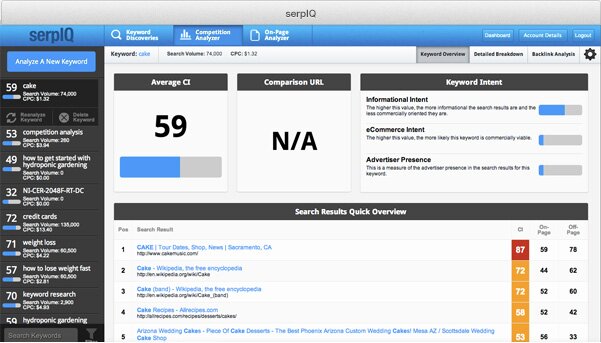Keyword Research For SEO: A Guide For Beginners
So much talk in the SEO world – mostly relating to getting backlinks – sometimes the “smaller” things are forgotten about. I’m talking about keyword research.
Optimizing your website for Google and the other search engines is extremely important, especially for newer blogs. Keyword research is necessary for targeting the correct keywords related to your blog’s niche – typically for new blogs this means keywords that are not too competitive and have a decent number (at least 150 or so) of searches per month.
For new bloggers, most keyword “research” is nothing more than coming up with several – usually high competition – keywords, plugging them into the Google Keyword Tool and then picking the highest search engine volume keywords out of that lot and basing your articles around optimizing for those (high, sometimes very high competition) keywords.
Sad fact is that if you are a new blogger you won’t be ranking for most of those high competition keywords anytime soon, if ever.
Instead you need to optimize your blog posts for on-page SEO based on low competition (longtail) keywords. Doing this will help you rank high on Google for certain keyword phrases, which will inevitably earn your more in either revenue from affiliate links or clicks on your Google Adsense ads.
Recommended Reading: Google Adsense Ready WordPress Themes
Researching Keywords For SEO
How To Determine A Keyword’s Value
So how much value is a keyword worth to a blog? I will be using a proxy social media website for this long tutorial. So my website’s niche is social media, obviously the phrase “social media” is one I would love to rank for. Unfortunately my website is a bit new and I would have a very hard time ranking for such a competitive keyword phrase.
And that’s the first thing you should consider when looking for keywords. What is the competition around that keyword phrase. Searching for “social media” I’m bound to get a lot of high authority websites that probably cannot be outranked such as socialmediaexaminer.
You also need to make sure your keyword has enough search traffic per month. If it has very little (and even if it’s a low competition keyword) it’s probably not worth trying to rank for. Thankfully, there are plenty of keyword research tools that will enable you to find all of this information and more.
Longtail Keywords
 This brings us back to our “social media” keyword phrase that we would love to rank for. Yes, ranking for “social media” would give us huge amounts of traffic, but it also pits us against many authority websites that are impossible (or at the very least, will take time) to beat.
This brings us back to our “social media” keyword phrase that we would love to rank for. Yes, ranking for “social media” would give us huge amounts of traffic, but it also pits us against many authority websites that are impossible (or at the very least, will take time) to beat.
74,000 searches a month makes it tempting to attempt to rank for such a competitive keyword phrase as ‘social media’. But if your website is new (less than a year old) then you will have to focus on longtail keywords.
Longtail keywords, while having far less in terms of searches per month, do tend to convert better than more general search terms such as ‘social media’. This is because they typically catch visitors in the later stage of the converting process. I’ll give an example, a potential buyer who is searching for “web hosting” is probably in the early stages of shopping around. But a buyer who is typing in more specific search terms like “best web hosting for wordpress blogs” is nearing the ending point of converting (in this case the ‘converting’ would be to click on your web hosting affiliate link).
So while Longtail keywords are far less in number when it comes to searches, they do have the advantage of converting a bit better.
Write A List Of Keywords That Relate To Your Website
Starting off with your SEO keyword research, you’ll first need to think of some relevant topics related to your website’s niche. It’s a good idea to think up four or five more general topics, you will then use the next steps to come up with longtail keyword phrases that you hope to rank for.
What topics do you blog about on a regular basis? Think broad topics like “blogging” or “blogging tips”, “social media”, “content marketing”, “email marketing”, “search engine optimization (SEO)”, “WordPress”, etc.
Next – after picking your more general topics – you will start to look into more narrow topics of those general phrases to start researching.
Find Narrow Topics Of Your General Keywords
You should try to wear the reader’s shoes for a moment and think about what they would type into the search engines. For example, if you are in the content marketing or social media niche, what types of keyword phrases would your target audience search for that you think you could rank in Google and the other search engines for?
 Finding keywords that are related to broad topics might be frustrating…well that is unless you know what tools to use to help you along the way (more on that below).
Finding keywords that are related to broad topics might be frustrating…well that is unless you know what tools to use to help you along the way (more on that below).
Lets use our social media website as an example. If you are all about social media, topics you should start brainstorming longtail keywords for should be what you think think people are searching for in the search engines relating to that topic.
Longtail keywords, while generally searched for less (see graph above), are normally far easier to rank for since there isn’t nearly as much competition for them.
Some narrow topics related to social media that you may try ranking for:
- How to grow your social media audience
- Social media sharing buttons for WordPress
- Social media marketing trends
- Social media marketing strategies
- 5 ways to build an engaged Pinterest following
- Improve your LinkedIn Profile In These Easy Steps
- 10 ways to improve your social media engagement
You get the point. This step is still in the beginning phase so you don’t need to think up a complete list of keywords yet, you want to simply write some keyword phrases down that you think are related to your website’s niche, have enough search traffic per month and that are able to be ranked for (low-medium competition keywords). The list you create in this phase will be thinned out later on after you move to the below steps.
If you are having trouble getting started you might use some sort of program to find out what keywords you are currently getting organic traffic for. There are plenty of analytics tools to help with this task, probably the most popular (and free) tool is Google Analytics.
Find Related Keywords
This step is meant to increase your keyword stock before you get to the researching aspect of this post. By the end of it you should have enough keyword phrases to go into the research step.
There are one of two (or two of two) things you can do to add to your keywords within this step. The first is to go to Google, type in your keyword phrases and then look in the “searches related to (‘keywords’)” at the end of the page.

The second is to use the Google Keyword Tool, plug in your search phrases and look at the related suggestions.

As you can see, the Google Keyword Tool gives you a few important metrics included with your related keywords such as monthly searches and how much competition there is with that keyword phrase.
Research, Research, Research
Now it’s time for the fun part: researching your keywords to determine if they are worth ranking for. There are plenty of tools to use for this task, sadly only a few of them are free.
I use a few tools to research competition level and monthly searches. The first and most obvious is the Google Keyword Tool that we used above.
With Google Keywords you are able to plug in your keyword phrases and see how many monthly searches those phrases get and what the competition level is.
To use the Google Tool you will have to sign up for a free account. After you do follow these quick steps:
- Enter your keyword phrases (one phrase per line)
- Switch from the ‘ad ideas’ to ‘keyword ideas’ – this will take you to a page similar to the above screenshot
- Analyze the two main metrics, monthly searches and competition (it may also be a good idea to write them down)
You should research further and find out what types of websites are ranking for your desired keywords. If all or most of the top ten results on Google are extremely high authority sites then it’s probably a good idea to move onto another keyword.
You will probably need a more advanced tool when researching keyword competition, monthly searches, etc. Like with most things, there are few and far between when it comes to free tools. Most of the tools available are, at best, trial software that give you a free 7 – 30 day test run. I will list a few of the most popular here.
SerpIQ gives you a wealth of important metrics about your desired keywords. Here it offers the competition level (59) and quick overview of the search results (ie what websites are ranking for the keyword on Google’s top ten results). With it you can view how much authority your competition has, which will help signal how difficult it will be to outrank those competitors.

There is a lot more this program can do, another useful feature is the keyword discoveries tool. With it you can analyze search volume, competition, ads and related words to your keyword phrases.

SEMRush has a version of this as well. With their tool you are able to analyze the difficulty score of your keywords out of 100, the search volume that keyword receives and the trend of the keyword phrase.
SEMRush has its limitations however. It isn’t as advanced as SerpIQ in terms of analyzing competition, keyword intent, websites ranking for the keywords, etc. But it does give a better difficulty impression of your keyword than the Google Adwords Tool which gives competition in the form of ‘high, medium or low’. With SEMRush you get an actual percentage which tells a lot more about how difficult it will be to rank for those keywords.
Add Even More Keywords To Your List
After researching your keywords, cutting many from your list because of too much competition or too low volume of searchers per month, you will probably have to add more keywords to your thinned out list. You might have to repeat some of these steps before you have a complete list of keywords so feel free to do these steps more than once.
So what’s another great and free way to find even more keywords for your list?
Keyword Spy is one of my favorite researching tools for a quick look at key metrics. It is an easy (and very fast) researcher that shows you important things related to your phrase such as how much PPC competition you will have, search volume per month, Ad data and related keywords.

Another great researcher to use to come up with new keywords is to plug existing keywords into the free ubersuggest tool.
With ubersuggest you get a keyword researcher that is similar to Google Keywords in that it will list related suggestions after you type in your current keyword. This nifty program takes it a step further though and runs your keyword phrase throughout the alphabet and then shows you the most frequently searched out phrases.
So here I typed in “social media marketing strategy” and it shows me hundreds of related phrases for that keyword phrase:

Since it shows you the actual search behavior related to your keyword phrase this tool is extremely helpful, especially if you are having trouble coming up with low competition keywords.
Have this program up and running along with the Google Adword Tool, run your keyword phrases into ubersuggest and then plug the keywords you like into Google (to make sure they have low competition and some search volume) and start adding to your list of low competition, decent level search engine volume (150~) keywords.
Getting With The Trends
It’s not a bad idea to analyze what is currently “trending” in your website’s niche either. You can do this a few ways, the most obvious is to use the Google Trends website to see if keywords related to your website are gaining in popularity.
The numbers on the graph (which you need to hover over to see) indicate interest over a period of years. For example, the 100 is not how many searches that keyword phrase has received, rather the highest search engine volume that keyword phrase has ever had. So the 100 on my search term: “Social media marketing strategies” happened in May of 2015 and has been steadily climbing over the months.

This is a good clue as to whether you should go after a keyword. As you can see, my keyword phrase has been gaining in popularity. And while the search engine volume according to Google (260 / month) isn’t that great, this graph tells me that the phrase will probably keep gaining in popularity in the coming months and years.
You don’t want to pick a keyword that has been steadily declining in popularity because by the time you are able to write your article, get indexed and start ranking for it there may not be enough traffic to make it worth your while.
Lets take a look at a keyword phrase that his been steadily decreasing in popularity. “Keyword Research” (what this article is about) is still a highly searched for phrase but it has been steadily decreasing in popularity since about 2010. ![]()

If your already low searched keyword phrase has a trend similar to this it’s probably best to ditch it and move on.
Another tool I like using to help me write articles and find keywords is Buzzsumo. With Buzzsumo you simply type in your keyword and it will direct you to the most popular articles on the internet for that keyword. It gauges popularity by how many social shares those articles receive.
Search for your keyword phrase(s) can give you some great ideas for article topics and can help alert you if that article is a hit or not. After all why would your write an article about something people have little interest in?
Here are my results for: “keyword research”

As you can see, Buzzsumo shows you what’s hot in your industry by social shares, even breaking down the social shares and letting you filter. You can show articles for different content types such as infographics and guest posts and can filter results by day, week, month, year or a specific range (similar to how Google works).
This neat researching tool is free but it does limit you in how many searches you are able to preform per day so use it wisely. Also, you won’t be able to use many of the more advanced features such as viewing backlinks unless you subscribe to the pro version.
Keyword Resources List
As I mentioned above, there are plenty of keyword analysis tools, only a fraction are free however. Here is a run down of some of the most popular tools that I use when researching keywords:
- Google Keywords Tool – This is the tool to use when researching keywords. Not only is it free, since it’s a Google creation you can count on it being accurate. You can view how many global and local searches your keywords receive per month and view how much competition there is for your desired keywords. The only peeve I have with this tool is that it does not detail how much competition there is, simply giving you their measurement of either high, medium, or low competition.
- SEMRush – This is a premium keyword researcher but it comes with a free trial. You can think of it like Google Keywords but unlike Google, you get more detailed info regarding competition. With it you can view how much competition there is for your keyword by %, with 100% being the highest. You are also able to see the total results for that keyword and the trend.
- Google Trends – Google Trends is another free tool that allows you to see the trend of your keyword. It measures trends from 0 – 100, but is a bit unique in that it shows you (by the measurement of 100) what month your keyword has had the most searches preformed for it.
- Ubersuggest – Probably the best program to use to find keywords for your list. Simply type in your keyword and watch Ubersuggest go to work and list hundreds of related keywords, helping you fill out your longtail list.
- Mozbar for Google Chrome – Great for a quick SEO analysis on the fly.
- Keyword Spy – A fast and easy tool great for a quick (but in-depth) overview of your keyword. Similar to Google Adwords but you can use this one without having to sign in.
- Buzzsumo – One of my absolute favorite tools. Buzzsumo is great for finding out what’s “hot” in your industry, making this a great researcher to find keywords and to find article topics to write about.
- Serpiq – Another paid program, but one that comes with a free trial. Serpiq has too many features to list and is one of the best, if not the best, tool to use for keyword research.
If you are looking for a completely free program to use then I recommend Google Keywords. It is not the most advanced keyword research tool (it’s free after all), but it will give you all of the basic information you need such as competition and how many global and local searchers are preformed for that keyword phrase per month.
Phew, Finally Done
Well hopefully researching your keywords doesn’t take as long as writing this article did. You should now have a good dozen or so longtail keywords to start focusing on and (hopefully) start getting some organic traffic from. Once you start gaining more and more organic traffic and authority you will be able to start adding more keywords to your list.
Just know that you won’t be getting huge amounts of traffic for these longtail keywords since most of them only average around 200-400 searches a month. This means you will have to type up a good hundred or so articles, all of which need to be high quality, before you start getting good bits of traffic.



















Hi Matt,
This is a great article. I’m new to blogging and it is very helpful.
Quick question, is there an optimal quantity of keywords to go after or the more the better.
IMO not really. You just need to find the “best” keywords to target in terms of how relevant they are to your website’s niche and how good they are in terms of low competition and decent search volume. Preferably you want as many as possible because you need topics to blog about.
Great 🙂
Thanks a lot!
Brilliant Guide Matt.
Keyword research one of the factors, which decided our fate, when we start a new niche. I highly recommend this guide to newbies.
Btw, I love to choose a lot of long tail keywords as well as some short tails with high searches and then focus on them with gray Hat SEO. So far, working fine for me and I hope it will in future too.
Cheers.
Hello,
Long tail keywords, like you correctly opined, drive more targetted traffic and in the long run, converts far better.
However, long tail keywords (and their numerous variations) also help bloggers and information marketers avoid Google penalties for keyword stuffing as an article that properly follows this standard appears natural both to readers and search engines.
…while being also, very highly optimized!
Be certain to make the day great!
Always,
Taposh